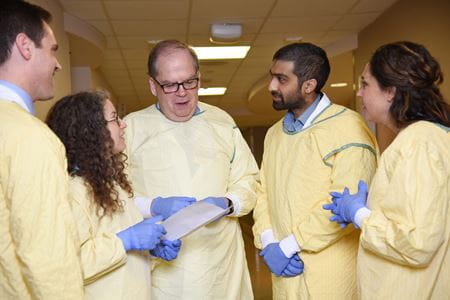INDIANAPOLIS—For Hoosiers, finding reliable access to mental health care is too often an uphill battle. More than 50 percent of Indiana counties are without a single practicing psychiatrist. Statewide, the number of psychiatrists is half the national average.
Indiana University School of Medicine is bridging this divide in services by significantly increasing the number of psychiatrists it trains per year.
The school is growing its Indianapolis programs by a third, with support from more than $4.7 million in grant funding from North Central Health Services. It is also adding a new program to train four psychiatrists a year in southwest Indiana, in collaboration with Good Samaritan Hospital in Vincennes.
“There is a very clear and pressing need for more psychiatrists in many areas of the state. We recognize how important access to this care is for all Hoosiers, and one of our primary goals is to lead the way in filling that gap,” said Thomas McAllister, MD, chair of the IU School of Medicine Department of Psychiatry. “Along with training more psychiatrists, we also appreciate the need to dispatch this care to communities in a way that works for people—taking a common sense approach to cut down on wait lists and make trips to the doctor more convenient and practical.”
The North Central Health Services grant will allow the school to:
- Increase the number of general psychiatry residents admitted into the program each year from six to eight
- Add an additional resident each year who is trained in adult, pediatric and adolescent psychiatry
- Create a new fellowship position, which provides advanced training in a highly-specialized area, such as addictions or geriatric psychiatry.
“This grant will not only support psychiatrist resident training for the next decade, but also enable a new generation of psychiatrists for the state,” said director of residency Michael DeMotte, MD, who was a leader in securing the grant funding. “This grant will give us a much-needed infrastructure to our residency training, and will help us extend quality mental health outreach to a greater number of Hoosiers.
At the same time, the school is adding a new program to train psychiatrists in a sub-specialty known as consultation liaison psychiatry—in which psychiatrists often treat patients in primary care settings, rather than at a specialty mental health clinic. IU School of Medicine faculty psychiatrists, in partnership with IU Health, are already offering this service in select areas and will now train future psychiatrists specifically for this role.
“We have initiated a program known as CHOICE, which places our faculty members in large, busy, primary care practices that greatly expands our ability to reach patients with mental health needs,” McAllister said. “Patients love it, they don’t have to go on a waiting list, and they have the convenience of not having to make another appointment or travel somewhere else for care.”
An added focus will also be on rural areas of the state that are disproportionately underserved with the current number of psychiatrists. The grant will provide flexibility for residents to spend more time in these areas and outside the academic health center in downtown Indianapolis.
Additionally, the new program in Vincennes will admit its first class of residents in summer 2019.
The overall goal is to encourage more IU-trained psychiatrists to practice throughout the state and in a rural settings residency. Two-thirds of residents practice in the state in which they train. Increasing the number of trainees is the most predictable way to increase the future number of physicians practicing psychiatry for Indiana.
Indiana University School of Medicine is one of the nation’s premier medical schools and is a leader and innovator in medical education, research and clinical care. The country’s largest medical school, IU School of Medicine educates more than 1,600 medical and graduate degree students on nine campuses in Indiana, and its faculty holds more than $300 million in research grants and contracts, to advance the School’s missions and promote life sciences. For more information, please visit medicine.iu.edu.
North Central Health Services (NCHS) was created in 1984 to serve as the parent company of a family of corporations which included Lafayette Home Hospital, Home Hospital Foundation, and Service Frontiers Incorporated. Today, NCHS has a primary responsibility to operate River Bend Hospital, a nonprofit inpatient psychiatric hospital, licensed and certified by the Indiana FSSA Division of Mental Health and Addiction and accredited by the Joint Commission. NCHS also is a grant-making organization, providing primarily capital grants to 501(c)(3) organizations in Benton, Carroll, Clinton, Fountain, Montgomery, Tippecanoe, Warren, and White counties in Indiana for the development of healthy communities, and initiating strategic funding partnerships to address the most critical health needs identified by the NCHS and River Bend Hospital Community Health Needs Assessment. Since 1999, NCHS has awarded over $65 million in grant funding to more than 200 organizations. For more information, visit nchsi.com




